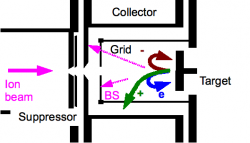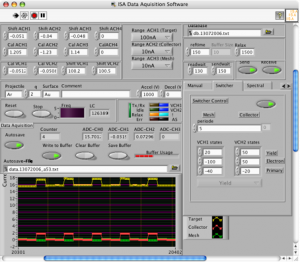Total electron emission yield measurement
 We use a more sophisticated modification of a simple current measurement method for the measurement of the toatl electron emission yield from solid surfaces. In the regime accessible by our ECR ion source we are able to investigate aspects of kinetic electron emission (KE), driven by the kinetic collision effects between the projectile and the electrons in the sample, as well as potential emission (PE), which is driven purely by the potential energy the ion is carrying due to its missing electrons.
We use a more sophisticated modification of a simple current measurement method for the measurement of the toatl electron emission yield from solid surfaces. In the regime accessible by our ECR ion source we are able to investigate aspects of kinetic electron emission (KE), driven by the kinetic collision effects between the projectile and the electrons in the sample, as well as potential emission (PE), which is driven purely by the potential energy the ion is carrying due to its missing electrons.
 By applying an electric field between the sample surface and a surrounding set of electrodes we can suppress electron emission and extract the electrons, respectively. By the comparison of the measured electrical currents for these different cases one can calculate the mean number of electrons, which have been emitted due to the impact of an ion.
By applying an electric field between the sample surface and a surrounding set of electrodes we can suppress electron emission and extract the electrons, respectively. By the comparison of the measured electrical currents for these different cases one can calculate the mean number of electrons, which have been emitted due to the impact of an ion.
Our interest focuses on two major aspects: (i) the investigation of 'technical surfaces' for fusion devices like ITER, and (ii) studies of the fundamental physics of ion-surface interaction. The information on fusion-relevant surfaces is necessary for the correct modeling of the plasma-edge region, which influences the performance of future fusion devices.
Recently we were investigating the behaviour of proton-induced electron emission from gold at very low impact energies low the kinetic threshold. The velocity-dependence was compared to electronic-stopping data.
The electron emission experiments have been carried out with our ECR ion source, using 4.5keV Ar9+ projectiles.
Contact: Gregor Kowarik
Thanks for contributions to Michael Brunmayr.
Publications:
J. Lorincik, Z. Sroubek, M. Brunmayr, G. Kowarik, and F. Aumayr
Kinetic electron emission due to perpendicular impact of carbon ions on tungsten surfaces
Appl. Surf. Sci. (2009), in press
S. N. Markin, D. Primetzhofer, S. Prusa, M. Brunmayr, G. Kowarik, F. Aumayr, and P. Bauer
Electronic interaction of very slow light ions in Au - Electronic stopping and electron emission
Physical Review B 78 (2008) 195122 1 - 6
G. Kowarik, M. Brunmayr and F. Aumayr
Electron emission from tungsten induced by slow, fusion-relevant ions
Nucl. Instrum. and Methods B, to be published
Back to Ion-surface-interaction


